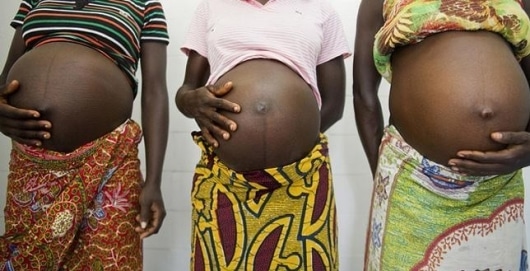Teenage pregnancy, also known as adolescent pregnancy, is pregnancy in a female adolescent under the age of 20. This includes those who are legally considered adults in their country. The WHO defines adolescence as the period between the ages of 10 and 19 years. Pregnancy can occur with sexual intercourse after the start of ovulation, which can happen before the first menstrual period (menarche). In healthy, well-nourished girls, the first period usually takes place between the ages of 13 to 16.
Pregnant teenagers face many of the same pregnancy-related issues as older women. There are additional concerns for those under the age of 15 as they are less likely to be physically developed to sustain a healthy pregnancy or to give birth. For girls aged 15–19, risks are associated more with socio-economic factors than with the biological effects of age. Risks of low birth weight, premature labor, anemia, and pre-eclampsia are not connected to biological age by the time a girl is 16, as they are not observed in births to older teens after controlling for other risk factors, such as access to high-quality prenatal care. Teenage pregnancies are related to social issues, including lower educational levels and poverty. Teenage pregnancy in developed countries is usually outside of marriage and is often associated with a social stigma. Teenage pregnancy in developing countries often occurs within marriage and half are planned. However, in these societies, early pregnancy may combine with malnutrition and poor health care to cause medical problems. When used in combination, educational interventions and access to birth control can reduce unintended teenage pregnancies.
In 2015, about 47 females per 1,000 had children well under the age of 20. From 2015 to 2021, an estimated 14 percent of adolescent girls and young women globally reported giving birth before age 18. Rates have historically been higher in Africa. In the developing world about 2.5 million females under the age of 16 and 16 million females 15 to 19 years old have children each year. Another 3.9 million have abortions. It is more common in rural than urban areas. Worldwide, complications related to pregnancy are the most common cause of death among females 15 to 19 years old.
In 2021, 13.3 million babies, or about 10 percent of the total worldwide, were born to mothers under 20 years old.
The World Health Organization defines adolescence as the period between the ages of 10 and 19 years. The mother’s age is determined by the easily verified date when the pregnancy ends, not by the estimated date of conception. Consequently, the statistics do not include pregnancies that began at age 19, but that ended on or after the woman’s 20th birthday. Similarly, statistics on the mother’s marital status are determined by whether she is married at the end of the pregnancy, not at the time of conception.
According to the United Nations Population Fund (UNFPA), “Pregnancies among girls less than 18 years of age have irreparable consequences. It violates the rights of girls, with life-threatening consequences in terms of sexual and reproductive health, and poses high development costs for communities, particularly in perpetuating the cycle of poverty. “Health consequences include not yet being physically ready for pregnancy and childbirth leading to complications and malnutrition as the majority of adolescents tend to come from lower-income households. The risk of maternal death for girls under age 15 in low-and middle-income countries is higher than for women in their twenties. Teenage pregnancy also affects girls’ education and income potential as many are forced to drop out of school which ultimately threatens future opportunities and economic prospects.
Several studies have examined the socioeconomic, medical, and psychological impact of pregnancy and parenthood in teens. Life outcomes for teenage mothers and their children vary; other factors, such as poverty or social support, may be more important than the age of the mother at the birth. Many solutions to counteract the more negative findings have been proposed. Teenage parents who can rely on family and community support, social services and child-care support are more likely to continue their education and get higher paying jobs as they progress with their education.
A holistic approach is required in order to address teenage pregnancy. This means not focusing on changing the behaviour of girls but addressing the underlying reasons of adolescent pregnancy such as poverty, gender inequality, social pressures and coercion. This approach should include “providing age-appropriate comprehensive sexuality education for all young people, investing in girls’ education, preventing child marriage, sexual violence and coercion, building gender-equitable societies by empowering girls and engaging men and boys and ensuring adolescents’ access to sexual and reproductive health information as well as services that welcome them and facilitate their choices”. Rates of teenage pregnancies are higher in societies where it is traditional for girls to marry young and where they are encouraged to bear children as soon as they are able. For example, in some sub-Saharan African countries, early pregnancy is often seen as a blessing because it is proof of the young woman’s fertility. Countries where teenage marriages are common experience higher levels of teenage pregnancies. Many teenagers are not taught about methods of birth control and how to deal with peers who pressure them into having sex before they are ready. Many pregnant teenagers do not have any cognition of the central facts of sexuality. Economic incentives also influence the decision to have children. In societies where children are set to work at an early age, it is economically attractive to have many children
A study conducted in 2019 found that, adolescents who were more exposed to sexuality in the media were also more likely to engage in sexual activity themselves. According to Time, “teens exposed to the most sexual content on TV are twice as likely as teens watching less of this material to become pregnant before they reach age 20”.
Comprehensive sex education and access to birth control appear to reduce unplanned teenage pregnancy. It is unclear which type of intervention is most effective.
The Dutch approach to preventing teenage pregnancy has often been seen as a model by other countries. The curriculum focuses on values, attitudes, communication and negotiation skills, as well as biological aspects of reproduction. The media has encouraged open dialogue and the health-care system guarantees confidentiality and a non-judgmental approach.
Teenage pregnancy can be reduced by sex education as a study in 55 US counties (out of 2,927 counties) showed. The study used federal funded sex education programs as a proxy for sex education, but provided no details about funding levels, the number of students reached, or the amount of time spent on sex education. Nevertheless, the reduction of teenage births (not pregnancy) was significant, at 3% reduction, indicating that an increase in funding, education, or reach could increase teenage pregnancy even further. Although 3% sounds like a small number, given a teenage girl population of 10 million females aged 15–19 (in 2020), and 190,000 teenage births per year, a 3% reduction would translate to about 6000 prevented teenage births per year when extrapolated to the whole nation.
Ad promoting abstinence in Ghana for prevention of unplanned pregnancy and HIV/AIDS (2005)
Some schools provide abstinence-only sex education. Evidence does not support the effectiveness of abstinence-only sex education. It has been found to be ineffective in decreasing HIV risk in the developed world, and does not decrease rates of unplanned pregnancy when compared to comprehensive sex education. It does not decrease the sexual activity rates of students, when compared to students who undertake comprehensive sexual education classes.



